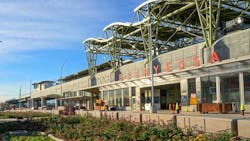Santa Clara VTA, BART agree to pause pre-revenue service operations
Phase 1 of the Santa Clara Valley Transportation Authority (VTA) built extension of the Bay Area Rapid Transit (BART) service to Silicon Valley will not open until 2020. The two agencies have deferred most pre-revenue operations on the BART Silicon Valley Berryessa Extension pending a revision of “a more practical work plan.”
The extension was to open for revenue service before the end of the year. The agencies called the decision to defer pre-revenue operations difficult but said they arrived at the conclusion “in the interest of achieving a safe and reliable start of revenue service.”
Phase 1 of the 16-mile BART Silicon Valley Berryessa Extension broke ground in 2012 and control of the infrastructure changed hands from Santa Clara VTA to BART in June 2019 with pre-revenue operations commencing on the extension in late October.
The agencies were involved in simultaneous efforts to complete final systems modifications and related testing, including BART’s system acceptance testing and readiness activities such as training and simulated service. Before these readiness tests and activities can continue, Santa Clara VTA will complete remaining testing which resulted from required modifications to train control and rail intrusion systems. Santa Clara VTA explains that resequencing these activities removes conflicts associated with track access and other facilities.
“All infrastructure projects include a period of acceptance from builder to operator. For transit projects, this responsibility usually resides within the single agency as owner. For the Berryessa Extension Project, this responsibility is being fulfilled by two separate agencies,” Santa Clara VTA posted on its website. “This means the period of acceptance involves personnel from two different agencies and is significantly more complicated. BART began this acceptance phase earlier this summer where it took control of the extension and began to perform a wide range of testing activities. During this ‘stress testing,’ items are identified for clarification, preference or correction.”
Santa Clara VTA also noted that properly addressing items identified during “stress testing” is an iterative process requiring significant coordination between itself and BART. It became impractical to simultaneously test, identify and implement resolutions and retest.
The agencies said they are are developing a revised testing and training plan that includes completing all testing and resolving all items identified during “stress testing” before resuming full pre-revenue operations.
About the Author

Mischa Wanek-Libman
Group Editorial Director
Mischa Wanek-Libman is director of communications with Transdev North America. She has more than 20 years of experience working in the transportation industry covering construction projects, engineering challenges, transit and rail operations and best practices.
Wanek-Libman has held top editorial positions at freight rail and public transportation business-to-business publications including as editor-in-chief and editorial director of Mass Transit from 2018-2024. She has been recognized for editorial excellence through her individual work, as well as for collaborative content.
She is an active member of the American Public Transportation Association's Marketing and Communications Committee and served 14 years as a Board Observer on the National Railroad Construction and Maintenance Association (NRC) Board of Directors.
She is a graduate of Drake University in Des Moines, Iowa, where she earned a Bachelor of Arts degree in Journalism and Mass Communication.
